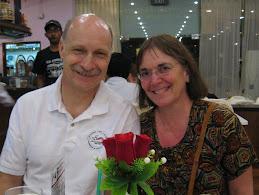I was able finally to connect with a dear friend last night from the old days in NY and tell her the news. It turns out that she's been going through her own fear-denial over a questionable mammogram and is going back in for a recheck this Friday.
We talked about feeling so incredibly uninformed at this point, after having spent so many years being (we thought), militant advocates for our own health care. We did all the right things and thought all the right thoughts. We questioned our doctors, got regular check-ups, ate the right things, exercised regularly (well, we mostly did but we also felt guilty when we didn't!). We breast-fed our children, being told that as a bonus, we were preventing breast cancer. We got off birth control pills as soon as we could. We didn't take estrogen when we became perimenopausal, gutted out the night sweats and the flashes. We complained about getting mammograms, but we went and got them anyway. We thought we were being excellent, in-charge-of-our-own-bodies women!
But there were some very basic things that we were never told, and now after only a dozen days on this roller-coaster, I am amazed at what I didn't know, or what I refused to look at.
For instance, in the back of my mind I already knew that more than half (and in some studies, almost 75%) of cases being diagnosed now are women with ZERO breast cancer in their families. Yet the chart on the wall in the gyn's office always lists "History" as the #1 major risk factor for developing breast cancer.
I did a 20-page college research paper back in 1994 on breast cancer and the suspected link with chemical compounds known as organochlorines. I remember being amazed at the preponderance of evidence between cancers of reproductive organs in both sexes and these compounds that are pervasive in our modern life. (Think anything that has been bleached, disinfected or processed to be clean or white, like paper products from coffee filters to tampons, and water supplies). I lived in a paper mill town for 16 years.
I worried about being mammogrammed too, though I did it when my doctor said to. I didn't think it was a good idea to be irradiating breasts with abandon. I was mammogrammed numerous times back in the 1970s when the technology was in its infancy, and radiation levels were way higher than they are now. We absolutely know that radiation exposure is cumulative and it causes cancer. Now I wonder if the radiation exposure of the tests themselves might be a causal factor too.
What I didn't fully realize until now is that mammograms are not a diagnostic tool so much as a "screening" tool. Mammos are also a legal cover-your-butt tool for the medical profession (which I actually did figure out about a decade ago). They have to follow the guidelines and recommend annual mammograms, so that if you do develop a problem, they can't be accused of negligence.
I also realize now that risk factors and mammograms are primarily used for separating large numbers of people into statistical groups, and ranking them according to possibility and probability of developing the disease. The tests are relatively cheap, most insurance plans cover them, there are programs for getting mammos free if you have no insurance, but the mammo isn't really a great diagnostic tool, it's just a first-step "snapshot" of who to look at further. How did I not develop that thought until now?
So, why do they call you back for more mammograms when the first one is questionable? Why not just go to the next step--cover you with cold goo and ultrasound you? Well, that's more expensive (although there's no radiation), and a fair percentage of films are flubbed because of human error in taking them, and they are still looking to screen out the "that's fine" from the "maybes." The ultrasound test is reserved for the "probables," and sadly, that may be too late for some women by the time they get to that step.
Here's a note I found on one radiology report from 2000: "Recall that approximately 8% of breast malignancies are NOT detected with mammography."
I never knew that. I was never told that. This stuns me.
It seems to me that the big push has been to get women to get mammograms, and that's certainly a good thing--it's better than nothing. But it's implied that mammograms are a silver bullet that will solve all of our breast cancer worries. We are told that mammograms save lives, but I was never aware of the test's limitations or its primary function until now.
Subscribe to:
Post Comments (Atom)





2 comments:
Pam,
Your blog is great and your information very interesting. You should let your husband read what you are writing. My felt the same about blogs until he started reading mine and understood why I needed to write mine.
See you tomorrow - MaryAnn
What a great start on your journey! I always knew you are a woman to be reckoned with. We are proud to know you.
Post a Comment